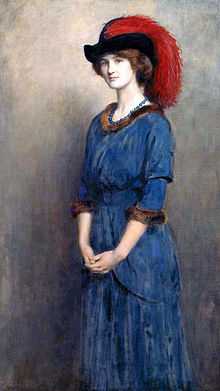A quirky ripple of literary synchronicity is running through our household at present. We suspect it's to do with the Victorian wainscoting. The phenomenon began with my reading Mary Hamer's deftly-imagined novel depicting the lives and travails of Kipling and his sister, Kipling & Trix, then developed into my wife discovering and then bequeathing to me the novelist Angela Thirkell (the Kiplings' cousin) and has most recently manifested itself in a reference to Thirkell's novels in the Elizabeth Jane Howard novel my wife is reading, The Light Years. Cue X-files theme.
 So I must add Ms Thirkell's literary work to the already overflowing basket of blessings with which my wife has presented me (where it nestles cosily alongside a regally ancient cat and a fiendishly ingenious domestic budgeting spreadsheet, among other articles). We have both started our Thirkular tour with High Rising, an inter-war tale of family, love (largely camouflaged beneath bushels of shyness or circumstance) and society. The introduction - by Alexander McCall Smith - to the recently reissued Virago edition makes comparisons to P.G. Wodehouse, a resemblance one can see in the playfully imaginative comedic language. For example, the headmaster of the school attended by the principal character's son barks: 'in the voice of a sergeant-major who had been educated among sea-lions'. Indeed much of the book's charm and humour derives from Laura's (said leading personage) robustly cynical utterances to, and descriptions of, her youngest son: 'Laura had once offered to edit a book called Why I Hate my Children'
So I must add Ms Thirkell's literary work to the already overflowing basket of blessings with which my wife has presented me (where it nestles cosily alongside a regally ancient cat and a fiendishly ingenious domestic budgeting spreadsheet, among other articles). We have both started our Thirkular tour with High Rising, an inter-war tale of family, love (largely camouflaged beneath bushels of shyness or circumstance) and society. The introduction - by Alexander McCall Smith - to the recently reissued Virago edition makes comparisons to P.G. Wodehouse, a resemblance one can see in the playfully imaginative comedic language. For example, the headmaster of the school attended by the principal character's son barks: 'in the voice of a sergeant-major who had been educated among sea-lions'. Indeed much of the book's charm and humour derives from Laura's (said leading personage) robustly cynical utterances to, and descriptions of, her youngest son: 'Laura had once offered to edit a book called Why I Hate my Children'
There are echoes, too, of Barbara Pym, Nancy Mitford and Jane Austen which combine, as the book simmers slowly and its ingredients blend, into a delicious concoction of social and character observation and the attempts of Angela and Fate to weave together kindred souls into a knot of romance. There is a good deal of clever suspense established as to who will end up with whom and how, and a sublimely-drawn villain in the form of the manipulative, scheming secretary, Miss Grey. Thirkell also offers some excellent writing about writing, as the popular novels Angela produces to keep her son in clothes (in which he can rapidly make mysterious holes) are contrasted with the more conventionally respected history books written by the irascible, curmudgeonly but much-loved Master of the Big House, George Knox, suspected amorous target of 'The Incubus', Miss Grey. The link in the first paragraph will waft you towards the UK Thirkell Society, a journey I recommend that you make.
Taking the connections off in a slightly different direction, Kipling & Trix has inspired me to borrow Kipling's complete verse from the library, in order that I can extend my knowledge beyond scattered portions of 'If' and a couple of well-known refrains. All I need now is a sponsored two-month holiday to get through this book. Lazy, he wasn't.
jabardast order follow k lie dhanywad i really enjoy the work
ReplyDeleteApna Showroom Dressing Hair Comb for Men lice comb women lice removal comb lice comb plastic lice and nit removal comb ju wali comb lice comb for women, Kids, Girls, lice combs for Ladies And Women lice combs
Apna Showroom Baby Girl's Knee Length Frock skirts dress for 18-24 months 12-24 1-2 years baby girls birthday dress(Red_18-24 Months)
Apna Showroom Grooming Hair Combs for Men and Women Lice Removal Shampoo combs set- Pack Of 3
bol baby bol thank a lot for this order follow k lie .